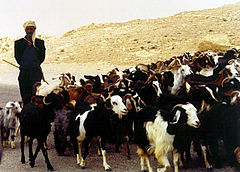| Revision as of 21:14, 24 February 2011 editJonkerz (talk | contribs)Autopatrolled, Extended confirmed users53,201 edits italics; rm empty secion; rm to loosely connected 'see also's← Previous edit | Revision as of 17:55, 20 August 2011 edit undoDeflective (talk | contribs)Extended confirmed users28,441 edits IPAc-en conversionNext edit → | ||
| Line 3: | Line 3: | ||
| ] ]s in ]]] | ] ]s in ]]] | ||
| A '''goatherd''' ({{ |
A '''goatherd''' ({{IPAc-en|icon|ˈ|ɡ|oʊ|t|.|h|ɜr|d}}) or a '''goatherder''' is a person who herds ] as a vocational activity. Similar to a ] who catches fish for a living, the drover here herds goats. Goatherds are popular in countries where goat populations are significant; for instance, in ] and ]. Goats are typically bred as dairy or meat animals, with some breeds being shorn for wool (see ]). | ||
| Fictional goatherds include Peter from ] '']'', and the song "]" from '']''. ]'s novel ''The Secret of Killimooin'', set in the fictional but probably eastern European country of Baronia, features a blind goatherd called Beowald, who is so in tune with his environment that he can roam the mountains using his other senses, apparently unhindered by his lack of sight. The word capriculturist, which is derived from Latin, began to appear with some frequency in the late 1940s.{{Citation needed|date=February 2007}} | Fictional goatherds include Peter from ] '']'', and the song "]" from '']''. ]'s novel ''The Secret of Killimooin'', set in the fictional but probably eastern European country of Baronia, features a blind goatherd called Beowald, who is so in tune with his environment that he can roam the mountains using his other senses, apparently unhindered by his lack of sight. The word capriculturist, which is derived from Latin, began to appear with some frequency in the late 1940s.{{Citation needed|date=February 2007}} | ||
Revision as of 17:55, 20 August 2011
| This article does not cite any sources. Please help improve this article by adding citations to reliable sources. Unsourced material may be challenged and removed. Find sources: "Goatherd" – news · newspapers · books · scholar · JSTOR (February 2011) (Learn how and when to remove this message) |
| This article possibly contains original research. Please improve it by verifying the claims made and adding inline citations. Statements consisting only of original research should be removed. (January 2008) (Learn how and when to remove this message) |

A goatherd (/ˈɡoʊt.hɜːrd/) or a goatherder is a person who herds goats as a vocational activity. Similar to a fisherman who catches fish for a living, the drover here herds goats. Goatherds are popular in countries where goat populations are significant; for instance, in Africa and South Asia. Goats are typically bred as dairy or meat animals, with some breeds being shorn for wool (see Goats in agriculture).
Fictional goatherds include Peter from Johanna Spyri's Heidi, and the song "The Lonely Goatherd" from The Sound of Music. Enid Blyton's novel The Secret of Killimooin, set in the fictional but probably eastern European country of Baronia, features a blind goatherd called Beowald, who is so in tune with his environment that he can roam the mountains using his other senses, apparently unhindered by his lack of sight. The word capriculturist, which is derived from Latin, began to appear with some frequency in the late 1940s.
Categories: